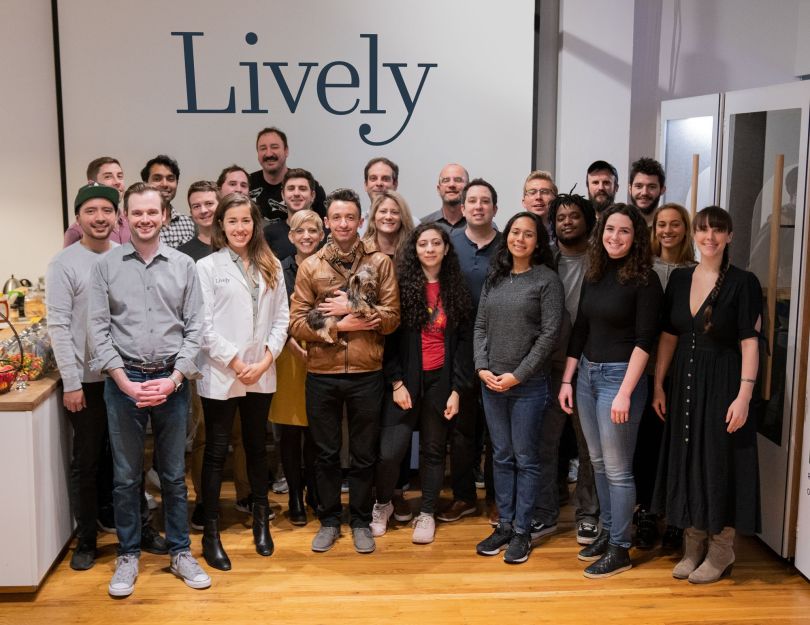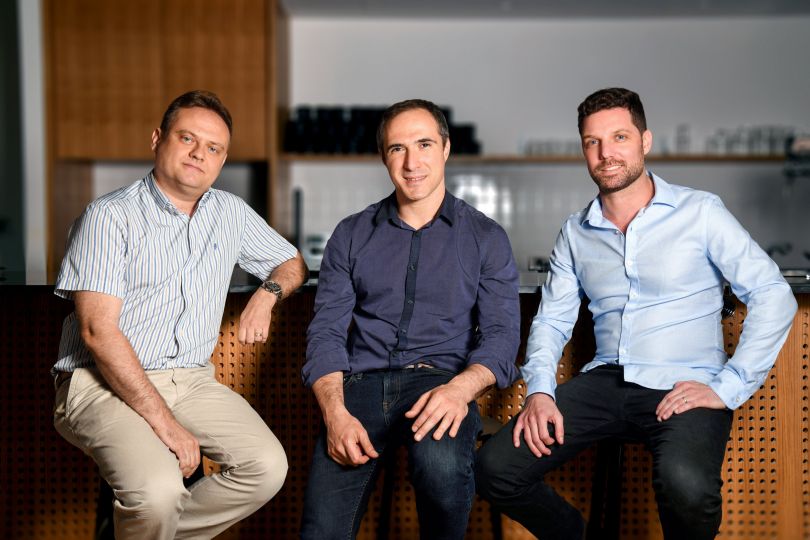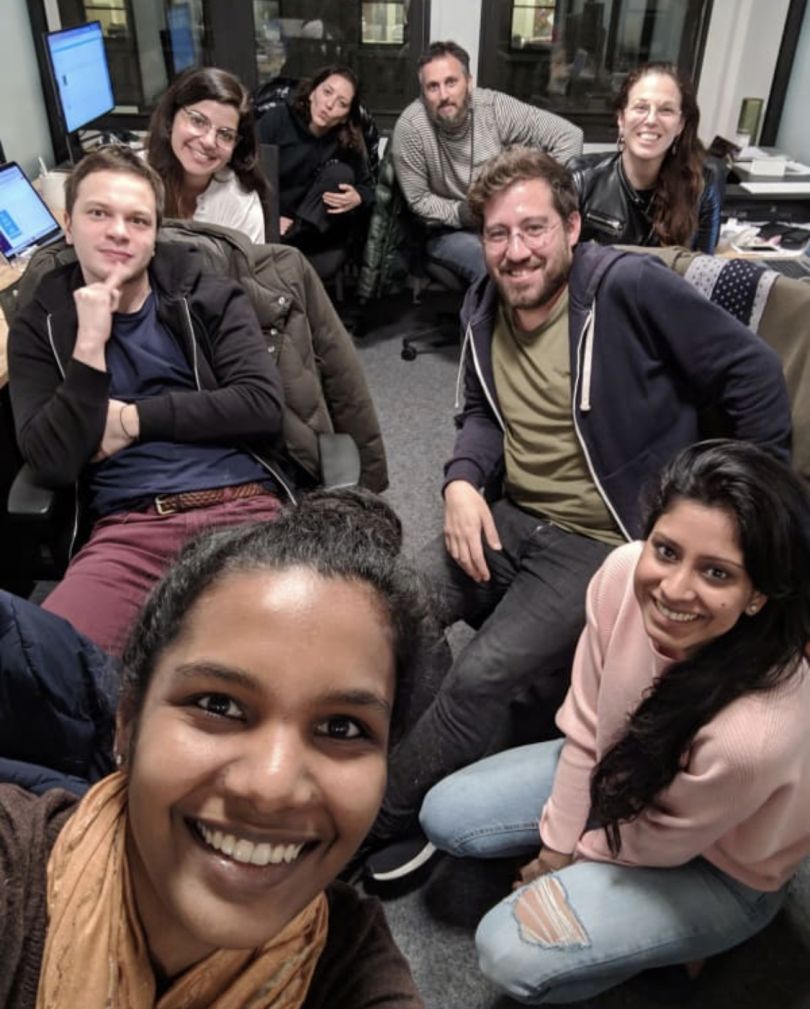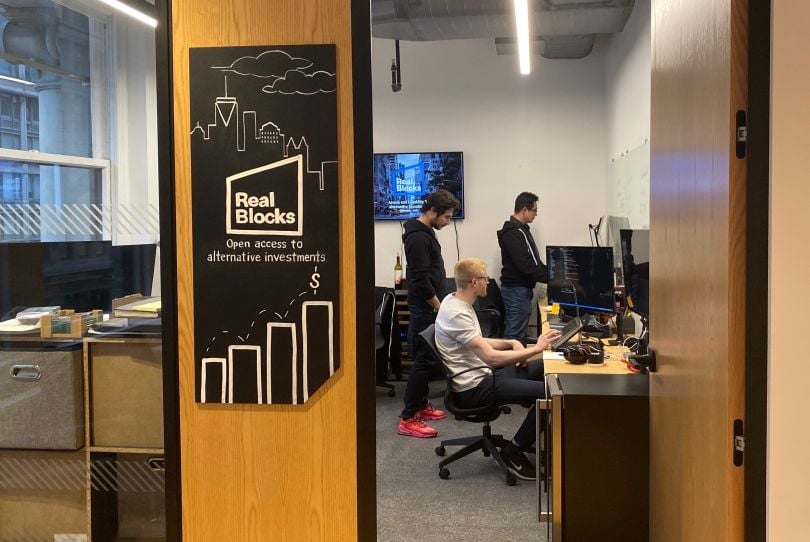New York City-based startups have soared in recent years.
The industries represented on our list of up-and-coming businesses share a common thread. From e-commerce to insurance to media, they all rely on cutting-edge technology — including analytics, artificial intelligence and virtual reality — to deliver a better customer experience.
It’s not too surprising that such a wealth of entrepreneurship and technological innovation has come out of NYC this year. According to the Startup Genome, New York has the highest percentage of open positions for AI and machine learning jobs of any single U.S. metropolitan area.
Below, find out why the following 50 companies, all founded within the last three years, have our attention.
Top NYC Startups To Watch
- Choosy
- Feather
- Great Jones
- Hydrogen
- Kangaroo
- Luminary Media
- RealBlocks
- Rhino
- Summer
- Unqork

Unqork helps enterprises like Transamerica, Liberty Mutual and Goldman Sachs build custom software without back-end code. The product allows for UX configuration, data input and exportation as well as performance monitoring. The company recently raised a Series B round to the tune of $80 million, pushing its overall funding above $100 million.

Galaxy Digital is a diversified merchant bank that’s growing at a rapid clip. Co-Founders David Namdar and Michael Novogratz started Galaxy Digital in 2018 and, in the same year, the company had an IPO on the TSX Venture Exchange. The team recently launched the Galaxy Bitcoin Fund and the Galaxy Institutional Bitcoin Fund, which are both passively managed investment options for institutional and accredited investors.

Hearing loss has significant social and physical consequences. To combat the stigma, Lively delivers hearing aids to customers following a quick, doctor-certified hearing test. Follow-up care and online resources are included with the service. According to Forbes, the company launched in January 2019 and opened its first Hearing Studio in the Chrysler Building in May.

Even for folks with an extensive financial education, managing a budget is a stressful endeavor. Brigit provides users with free budgeting tools, like overdraft predictions, alerts and loans. Additional features like financial tracking assistance and late-penalty fine removal are offered through an advanced membership. According to the company’s website, the platform has saved members more than $50 million in overdraft fees at an average of $500 per person.

Imagine a world without security deposits. Or, just google “Rhino NYC.” Rhino partners with rental spaces around the country to allow users to save their security deposits and call their new place “home” faster. By charging users for a monthly insurance plan that provides property owners the same coverage a deposit would, the startup claims that rooms rent 30 percent more quickly, with losses covered. The founders have raised over $22 million to date.

Ro focuses on patient-centric healthcare through its three products: Roman, Rory and Zero, which provide digital health clinics for men and women, as well as a 12-week program to help free smokers of their habit. Patients can reach out to their dozens of medical advisors with the touch of a button and get medication delivered straight to their doors. The company raised an $88 million Series A funding round in 2018 and an $85 million Series B in 2019.
Forty-four million Americans have student loan debt. It’s a topic you may have heard mentioned once or 500 times in recent political debates. With that statistic in mind, Summer certainly isn’t lacking a target demographic. The software service allows users to enroll in free federal saving and forgiveness programs in a manageable way. It also researches a user’s eligibility, provides comparisons of programs that best fit their needs and double-checks forms before they click “send.”

Atom Finance offers a collaborative software platform that leverages consensus estimates and SEC filings to help traders and market analysts track their investments. To date, the company has raised $12 million in a Series A round led by General Catalyst. While the simplicity and style of the platform shouldn’t be the sole reason for signing up, the creators of Atom Finance are hoping it will incentivize users to stay.

Great Jones helps property investors find quality renters, deliver reliable income and access local vendors for unit upkeep. They do so with services like data-driven rental analyses and full walk-throughs at move-in. According to the website, the founders’ mission is to make residential real estate ownership more profitable and more transparent. The team currently operates in seven states and has plans to expand this year.

Millennials aren’t settling down as fast as previous generations. So why would they spend a full month’s paycheck on sectional sofas or dining room tables only to leave them out to dry on the sidewalk a year or two later? Based on this trend, Feather saw a market ripe with opportunity. The subscription furniture company allows customers to access high-quality styles as their moods (or living arrangements) change. Since launching, Feather has secured $16 million in funding.

Kangaroo sells home security monitors that alert users to issues like open windows or suspected physical movement. Other platform features include water leak and smoke detection, as well as CO2 monitoring. The company uses end-to-end encryption so that users’ data isn’t accessible to, well, anyone who shouldn’t have it. At CES 2019, CNET reported that Kangaroo introduced a climate sensor, door sensor, keypad siren, doorbell camera and indoor camera to launch later this year.

Anvyl is a Manhattan-based supply chain company for businesses like Hims and Lola. Through its platform, companies can manage suppliers, oversee production and track product data. Anvyl reasons that when clients can track customers satisfaction, perfecting the merchandise becomes that much easier. Founder Rodney Manzo raised a $9.3 million Series A in July 2019.
According to betterbank.app’s website, one in four Americans don’t get necessary medical treatments because of a lack of funds. Their platform allows users to access cash when a medical emergency prevents them from working. Betterbank.app, a Brooklyn-based company, contributes a percentage of merchant purchases to a community fund, which customers can access for unforeseen medical cost coverage via cash payout.

Aptly-named Choosy gives customers an online shopping experience based on feedback from social platforms and consumer preferences. The company’s target demographic? Modern women who want a say in popular trends. Choosy uses Instagram as its main marketing tool –– and source of design inspiration –– to compete with modern brands like Zara and H&M. According to a 2019 Glossy article, the platform scans “some 95 million Instagram posts a day to pinpoint the most popular styles.”

Chronosphere provides enterprises with a monitoring platform based on M3, an open-source metrics infrastructure. This tool allows companies to monitor business applications, query billions of data points per second and analyze real-time insights. The platform, created by former Uber and Microsoft engineers, runs across all major cloud providers including Amazon Web Services and Microsoft Azure.

E-commerce startup cleancult’s mission centers around making the world a cleaner place. Through its website, customers can purchase all-purpose cleaner, liquid hand soap, dishwasher tablets and just about anything else needed to keep homes sparkling. The founders use zero-waste packaging, coconut-based ingredients and sustainable design that allows the company to remain carbon neutral.

Blue Apron founder Matt Wadiak has another food-based business up his sleeve. This time, it’s in the form of a transparent, regenerative supply chain called Cooks Venture. The company uses critical components of regenerative agriculture, a system that increases biodiversity and enriches soils, to produce healthier food and reduce carbon footprints. In September, the company announced a $12 million funding round from AMERRA Capital Management, LLC.

Last month, a data leak exposed the personal information of more than 3,000 Ring camera users. With dozens of data breaches splashed across the news in 2019, such an occurrence doesn’t feel like new news. That said, many people rarely consider the potential surveillance-related consequences of tech-based medical instruments. Cylera's patent-pending, AI-driven technology enables patient safety and proactive defense from cyberattacks on medical devices and hospital networks. In late 2018, Cylera raised $5.5 million in seed funding led by Samsung NEXT, Maverick Ventures and Two Sigma Ventures.

The next big idea might be a patent away from completion. Cypris is an online marketplace for buying, selling, licensing and marketing patents. According to its website, 97 percent of patents make less money than they cost to obtain. Cypris allows users to make the most of their patents in a number of ways, including offering their creations to companies with a license to develop them further. The startup claims it can not only protect entrepreneurs’ ideas but also allow their work to become a reality.

Fireblocks allows traders to store and transfer digital assets across exchanges securely and works to eliminate errors common with manual transactions on the blockchain. In essence, the security platform helps finance professionals breathe easier using a privacy-preserving computation method and patent-pending chip isolation technology. In June 2019, Fireblocks raised a $16 million Series A round.

Smart tech is everywhere, which makes protection increasingly difficult. Firedome proactively addresses vulnerabilities and responds to attacks in connected devices in real time. The software-only agent uses AI that updates its logic to prevent the same or evolved variants of the attacks in the future. CEO Moti Shkolnik came up with the idea after spending time as head of Israel’s National Cyber Security Authority unit. Firedome has raised $14.5 million in funding since 2018.

In a 2017 American Journal of Preventive Medicine study, people who visited social media platforms 58 times or more per week were over three times as likely to perceive social isolation than those who logged on just nine times per week. Generation Transfer is looking to reduce that correlation. The app helps parents and grandparents make meaningful digital connections with younger generations on a private platform. The content is meant to strengthen relationships rather than strain them.

HelloTabitha helps families organize their lives within a digital arena, whether that means coordinating after-school sports practice or checking in on homework assignments. The app allows parents to schedule events, share content and update tasks with their partners and children using a secure messaging feature. The company has raised roughly $3 million to date.

Home isn’t only where the heart is — it’s also where your community lives. Founders Hanan Lashover and Ran Harnevo created Homeis to help local immigrants like themselves connect with others online, or as they put it, “build a better internet for immigrants.” The company was founded in 2017, and the duo launched their first community in 2018. In August 2019, Homeis raised a $12 million funding round to accelerate its growth in new markets. What will 2020 bring? They’re thinking global expansion.

What would society look like if humans had more incentivizes to give back? The Humanified app offers users social impact challenges and lets them broadcast their efforts and support causes they care about. Latina founder Marla Gonzalez launched the company in response to the U.S. immigration “zero-tolerance” policy. The startup is still in beta.
Hydrogen is a financial resources ecosystem named after an abundant and essential universal element. Its goal? To provide more transparent and affordable fintech products to startups, insurance companies, innovation labs and other institutions. The platform includes an applications component and additional blockchain option. In the first quarter of 2020, the team is looking to add global banking as a service and add card issuance platforms to the site’s integration library.

When a close family member or friend passes away, it doesn’t matter whether it was expected or sudden; planning a funeral, canceling accounts and publishing an obituary are often the last thing on loved ones’ minds. Lantern founders Alyssa Ruderman and Liz Eddy have been there. That’s why they created a platform where users can find support marking what can feel like monumental tasks off a virtual checklist. Both founders have experience working for social justice-based companies with tech components.

Leap’s retail platform consists of branded stores that the company opens and operates in order to boost location-specific and online revenue for labels like Goodlife and ADAY. Leap is responsible for signing store leases and employing staff, thereby minimizing owner risk. In late 2018, the company raised a $3 million seed funding round led by Costanoa Ventures.
Livepeer allows developers to add live or on-demand video to their projects by leveraging the Ethereum blockchain. The company aims to increase reliability and reduce cost at scale by opening contribution to the greater community. Those who provide their coding services are paid in tokens that give them further incentive to make the platform as fully functional as possible. CEO Doug Petkanics and Co-Founder and CTO Eric Tang both previously worked at Groupon and went on to found publishing platform Wildcard Inc. before starting Livepeer.
With more than $100 million in funding, Luminary Media is on a mission to provide listeners with premium audio content like professor Daniele Bolelli’s “History on Fire” and Roxane Gay and Tressie McMillan Cottom’s “Hear to Slay.” The company offers personal recommendations and ad-free podcast access for premium users. The company recently named former HBO President and Chief Revenue Officer Simon Sutton as its new CEO.

Dog medication can start to look the same pretty quickly, but mixing up pills could cause a beloved pet serious harm. Mixlab customizes pet prescription ingredients, strengths, forms and flavors and delivers them to your door. According to its website, the company uses a strategy known as “compounding” to personalize each prescription for a user’s pet. In fact, the team is a member of the Professional Compounding Centers of America.

On the off chance any city-dwelling young professionals haven’t been persuaded of the benefits of talk therapy, MyWellbeing is working to make what is often the hardest part that much easier: finding a quality therapist. The free SaaS platform matches users with three personalized NYC therapists within 24 hours based on their answers to a questionnaire regarding logistics, technique, personality factors and more. Founder Alyssa Petersel started the company after struggling to find a therapist for herself in New York.
NOVA Fitness uses electrical muscle stimulation via a full-body fitness suit to bring consumers what the startup describes as a “more effective” workout. Its founders claim a 30-minute NOVA training session is equivalent to spending 90 minutes at a typical gym. The company has two physical locations in New York City, where users can take high-intensity interval training classes, activated yoga and booty bootcamps.

Pair Eyewear is an e-commerce platform that sells glasses with interchangeable frames for kids to mix and match. Customers can purchase the magnetic frame tops with designs ranging from neon to animal print. Pair Eyewear partners with The EYElliance to provide glasses to children who need them in the developing world. Every pair purchased means a pair donated.

Many dog owners can relate to the panic that ensues when Fido breaks into the holiday chocolates. Pawlicy Advisor provides health insurance coverage for issues spanning congenital and hereditary conditions to behavioral and routine care. Founders Woody Mawhinney and Travis Bloom started the company in April of 2018 after experiencing personal frustration with the pet insurance options on the market at that time.
Finding a health or wellness provider can be daunting. Finding a supportive, inclusive health or wellness providers as a member of the LGBTQ+ community can seem insurmountable. According to The Human Rights Campaign Foundation’s 2019 Healthcare Equality Index, 70 percent of transgender or gender non-conforming patients surveyed had experienced some type of discrimination in healthcare. New York City digital health company Queerly Health is on a mission to democratize access to LGBTQ+ healthcare via an online marketplace of vetted providers. The founders, who identify as LGBTQ+ themselves, said they are carving out an inclusive space in digital health that they would want to use.

Rocean’s mission is to help free the world from single-use plastic water bottles, a habit that, according to its website, uses up to 32 times more greenhouse gas emissions than drinking from the tap. When put that way, Rocean is hoping consumers will see the benefit of putting down the Fiji and Perrier — especially since Rocean’s device filters, flavors and carbonates water as well.

Since 2017, RealBlocks has been using blockchain technology to provide its clients with easier access to alternative investment options. The startup, aimed at financial intermediaries and alternative investment managers, connects investors with investment strategies that have enhanced liquidity levels, otherwise known as Open Alts. Clients can use the technology to multiply revenue streams and offer their customers more diversified products. In November 2019, the company announced a partnership with Phoenix American Financial Services to enhance its fund accounting and reporting services.

It’s everyone’s childhood dream realized: riding around New York on an on-demand electric moped. With Revel, any user with a valid driver’s license can download the app, reserve a Revel, unlock a helmet and get moving. The company is currently headquartered in Brooklyn and allows riders the ability to explore as far as Queens on two wheels. In December, Revel launched in Miami and has also rolled out in Oakland, Austin and Washington D.C.

SHOWFIELDS is in the business of narrative storytelling through physical experience. It partners with brands like quip and S’well and does more than just display wares in Manhattan retail showrooms. Think product testing stations, large neon signs and fashion-based art installations divided among four sprawling floors — it’s retail on steroids. Through March, the team is inviting patrons to visit House of SHOWFIELDS, an immersive theater experience that bridges art and retail.

For senior living facility residents who feel uncomfortable using technology like text messaging, constant communication can be a struggle. So Soundmind CEO Erum Azeez proposed a solution. The company partners with Amazon’s Alexa to give seniors the ability to harness the power of artificial intelligence through voice commands. Users can listen to music, connect with loved ones or request caregiver services straight from the machines already set up in their homes.

Newly-founded Speak It Yourself VR (SIYVR) helps users from around the world learn English with the help of fully immersive technology: virtual reality. The company uses 360-degree video, audio, text and voice recognition software to help Italian, Hebrew, Russian and Vietnamese customers, among others, master new languages. Co-Founder Nachum Ganor was a former Israeli Armed Forces Navy Seal, and partner Andrew Asnes has produced VR applications — and Broadway and off-Broadway shows.

If New York City is known for one thing, it’s either the pizza or the terrible rental market. Stoop, a flexible living platform added onto residential firm Mdrn, takes advantage of empty, move-in ready private rooms across the city. The company offers those rooms to users for an all-in-one monthly price. That means that on move-in day, there’s no setting up cable or bed-delivery logistics to iron out.
Supergreat allows real people to share honest reviews of the products they see all over their Instagram feeds. The platform provides answers to questions like: “Will this lipstick really last all day?” Users can subscribe to their favorite Supergreat users and share beauty tips and product reviews with the community. As of May 2019, the platform hosted over 30,000 beauty product reviewers on its site.
Surgeons developed Surgarai to improve patient care in the operating room. The company’s technology, which is under development in the United States, combines preoperative and intraoperative information so doctors are up to date on their patients when it’s most important. Now, biomedical engineer and surgeon Dr. Tran Tu Huynh can add “founder” to her list of credentials.

Taskade is a digital coworking platform that allows users to collaborate in real time, keep track of teams across calendars and visualize projects. The company raised a $5 million seed round in October from Grishin Robotics and Y Combinator. With Taskade software, entrepreneurs and interns alike don’t have to keep to-do lists in their heads.

Tend is breaking the (dental) mold and freeing people of one of their most common fears: going to the dentist. The platform allows users to book appointments online and finish their Netflix binges straight from the chair. Tend aims to make checkups more pleasant, emphasizing the dentist’s office as a judgment-free zone. The company currently has two studios in Flatiron and Wall Street, with three more locations set to open in the coming months.
Not looking to spend hours at your musty neighborhood jewelry store, but don’t want to order an engagement ring on Amazon? Meet The Clear Cut. Founder and CEO Olivia Landau is a fourth-generation jeweler who advises customers looking for the perfect engagement ring on design, cut, color and fit. The company markets mainly on Instagram and allows users to purchase directly from the platform.

VENN is a 24/7 post-cable network for gamers and sports fans. This year, its content will be distributed across a range of media platforms, similar to what’s currently available via Twitch and YouTube. To date, founders Ariel Horn and Ben Kusin have raised $17 million in seed funding. Kusin told Variety that the team plans on producing 55 hours of original programming per week, post launch.

xIris leverages the power of artificial intelligence to provide homeowners with monitoring services as a preventative measure against theft, accidents and explosions. What makes this more effective than traditional security systems? It detects multiple kinds of threats — like unauthorized entry and vandalism — operates completely in the cloud, provides real-time alerts and integrates with police systems. The software also integrates with pre-existing CCTV cameras. CEO Michael Bingham previously co-founded social media tool Swap.
About Built In NYC’s 50 Startups to Watch in 2020
Once each year, Built In NYC hand-selects startups that have the vision, team, focus and funding to drive innovation within the tech community. For our 50 Startups to Watch in 2020 list, we chose local companies founded within the past three years that we believe have positioned themselves for rapid growth and scaling in the year to come.



